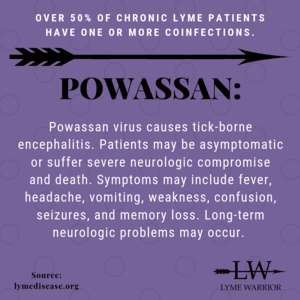What is Powassan Virus
What is Powassan Virus?
Powassan is a virus primarily transmitted by the black-legged or deer tick, Ixodes scapularis, the same tick that transmits Lyme. First recognized in 1958, very few cases of Powassan virus have been reported, but it is gaining attention as an emerging infectious disease because of its potential to cause severe, sometimes fatal illness.
This study published in the journal Vector Borne and Zoonotic Diseases in 2018 summarizes a review of Powassan virus cases in the United States between 2006 and 2016. During this time, there were 99 cases reported to the CDC. Since 2003, Powassan virus disease is considered a reportable disease, and doctors are expected to report any confirmed or suspicious cases to their local and state health departments who will then report them to the CDC. Data collection on the incidence of Powassan virus is limited by factors such as clinicians not considering the diagnosis, especially in mild cases.
The majority of Powassan virus cases in the United States have occurred in New England and the Great Lakes regions with Minnesota, Wisconsin, Massachusetts and New York seeing highest numbers of cases. The disease has also been reported in Canada and Russia.
What are the symptoms of Powassan?
The onset of symptoms is very rapid and can occur within as little as 15 minutes of a single tick bite.
Powassan virus disease (POWV) is categorized into two types: non-neuroinvasive and neuroinvasive.
The non-neuroinvasive type is a much more mild form of POMV, and is defined as those cases that do not result in neurological dysfunction. It is believed that some cases may even go undiagnosed due to the mild nature of this type.
Symptoms include:
Fever
Body aches
Headache
Chills
Neuroinvasive POWV is much more severe is defined as those cases resulting neurological dysfunction.
Symptoms include:
Fever
Body aches
Headache
Chills
Vomiting
Loss of coordination
Confusion
Acute flaccid paralysis
Neck pain
Meningitis or encephalitis
Seizures
It has been estimated that approximately 10% of neuroinvasive POWV cases result in death. Among survivors, long-lasting neurological dysfunction has been reported and many patients require ongoing rehabilitation.
Summary:
Powassan virus is an emerging, potentially fatal disease, the symptoms of which may develop within minutes of a tick bite. It is a rare but reportable disease most commonly reported in the Great Lakes and New England regions of the United States. Severe cases involve the central nervous system and may result in long-term illness.
Frequently Asked Questions about Powassan Virus
What is Powassan Virus?
Powassan Virus (POWV) is a rare tick-borne virus that belongs to the Flaviviridae family. It is primarily transmitted to humans through the bite of infected ticks, most commonly the black-legged tick (Ixodes scapularis) and the groundhog tick (Ixodes cookei).
What are the symptoms of Powassan Virus infection?
The symptoms of Powassan Virus infection can vary. Some individuals may not experience any symptoms, while others may develop mild to severe symptoms, including:
Fever.
Headache.
Fatigue.
Muscle aches.
Confusion.
Memory problems.
Seizures (in severe cases). Symptoms usually appear within 1 to 4 weeks after the tick bite.
How is Powassan Virus diagnosed?
Diagnosing Powassan Virus infection involves a combination of clinical evaluation, medical history, and laboratory tests. These may include tests to detect viral RNA or specific antibodies against Powassan Virus in the blood or cerebrospinal fluid (CSF). It is important to consult with a healthcare professional for proper diagnosis.
Is there a specific treatment for Powassan Virus infection?
There is no specific antiviral treatment for Powassan Virus infection. Supportive care is provided to manage symptoms, and hospitalization may be necessary for severe cases. Medications may be prescribed to reduce fever and relieve pain. It is essential to seek medical attention promptly if Powassan Virus infection is suspected.
Can Powassan Virus be prevented?
Prevention of Powassan Virus infection primarily involves tick bite prevention strategies, such as:
Avoiding tick-infested areas, especially wooded and grassy areas.
Using insect repellents that contain DEET or permethrin on exposed skin and clothing.
Wearing long-sleeved shirts, long pants, and socks when spending time outdoors.
Conducting regular tick checks on yourself, family members, and pets after outdoor activities.
If you develop symptoms after a tick bite, seek medical attention and inform your healthcare provider about the potential exposure to ticks.
Are there any complications associated with Powassan Virus infection?
Powassan Virus infection can lead to severe complications, especially in individuals with weakened immune systems or older adults. These complications may include encephalitis (inflammation of the brain), meningitis (inflammation of the membranes surrounding the brain and spinal cord), and long-term neurological problems.
Is Powassan Virus common?
Powassan Virus infection is considered rare, and the number of reported cases is relatively low compared to other tick-borne illnesses. However, the risk may vary depending on geographical location and exposure to infected ticks.
Remember to consult with a healthcare professional or local health authorities for specific guidance and recommendations regarding Powassan Virus and tick-borne disease prevention in your area.

